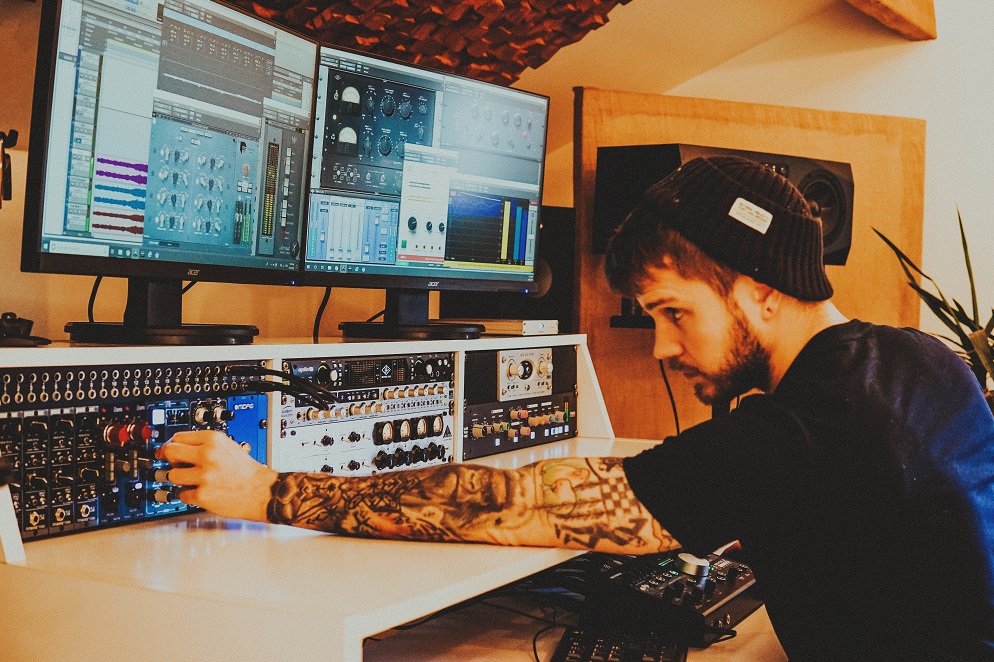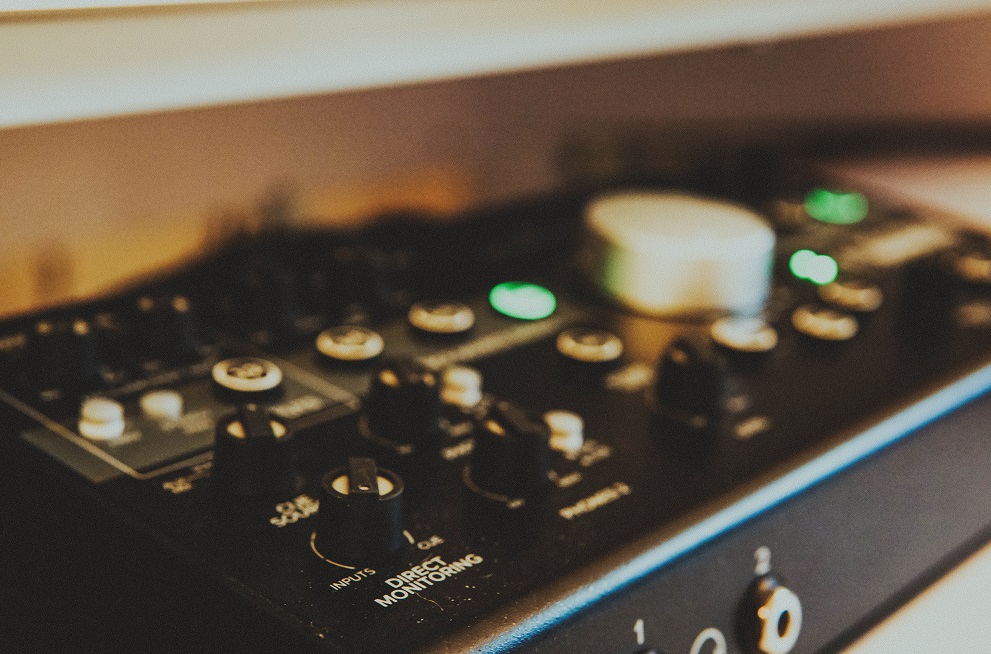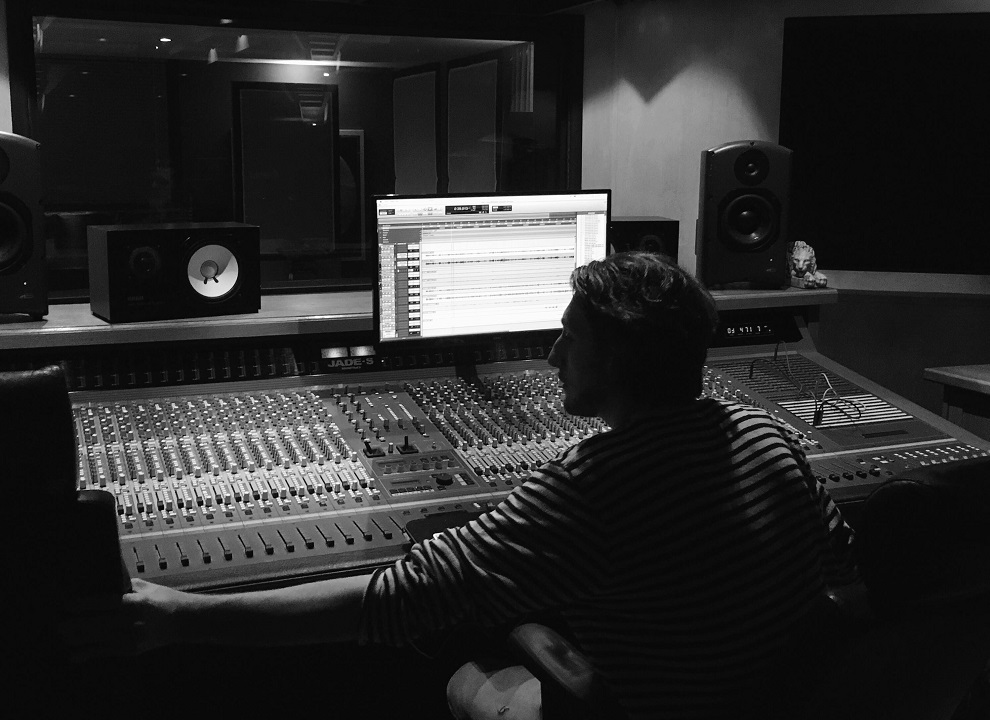The lowdown on mastering & why you should get your tracks mastered by a professional!
Blog by Jamie Hamilton under Recording & Production

The world of mastering has the tendency to seem a little baffling to the casual outsider. The final stage of processing before a release can be undervalued by independent artists, and is often misunderstood. It is so much more than ‘making it loud’.
We’re keen to deshroud the misty subtleties in the dark arts of mastering, so we’ve called in the experts. We picked the brains of two mastering engineers at the top of their game: Analogue Mastering Services (AMS) founder, Danny Thomas, and Ed Hall of All Silk Mastering.
Danny comes from a musical background, training as a classical guitarist before touring for 10 years with an orchestra. After finding his way into the studio as a full-time producer/engineer, Danny realised how much of a grey area that mastering was to musicians. This prompted him to found AMS, with the goal of providing professional, transparent and affordable mastering services. 5 years on, he has a wealth of impressive projects under his belt, including recent work with Lucy Whittaker, Jacob Welfair and Orlando.
Ed Hall has been an audio engineer for 12 years after jumping straight into training from school. Even before this, he showed a keen interest in the world of production - experimenting with whatever gear he could get his hands on: Cubase, Audacity, 4-track recorders and USB mics. After studying under the mentorship of former EMI engineer, Joe Fossard, Ed progressed onto Spirit Studios (previously SSR) before fine-tuning his mastering skills with guidance from MottoSound. Fast forward a few years, his All Silk Mastering House is well established having worked as an audio and mastering engineer on projects for the likes of Black Square Sessions, Skiddle, BBC Music Introducing, Highest Point Festival, Aston Microphones, Lewitt Microphones and Lockjaw Records. All Silk also runs an in-house series, 'All Silk Live Sessions', featuring live acoustic sessions from a range of artists.
What is mastering to you?
Ed Hall: The mastering process ensures that the audio is as well optimised as is possible, before making its journey into the public domain. This includes accentuating and diminishing the most musically desirable ranges of a track, finding the ideal ground between commercial loudness requirements and musical dynamics, and ensuring the natural flow of a series of tracks. It's both a musical and a technical service, which allows the artist and/or label to rest assured that the final stage has been completed by a pair of highly competent hands and ears.
Danny Thomas: To me, mastering is the final step in audio post production. It is the ‘cherry on the cake’ if you like. Its purpose is to make all of the final adjustments to volume, equalisation balance, stereo width, metadata and optimization across all playback systems and media formats.
Ed: The recording and mixing stages are often extremely long and arduous, whereas the mastering process is quicker, by comparison, and final. So it's important to deliver closure and end the process on a high.
What does a band get from a mastering engineer that they don't get from taking the DIY route?
Danny: Well, obviously, for one they get a real human who has been trained in the field to treat audio. Another huge pro for outsourcing mastering is the fact that you’re employing a professional to make your record sound the best it possibly can, and these people have the most useful tool apart from well trained ears - an outside perspective.
Ed: It's a hell of a service! Not only do you get an individual with access to a space that has been fully optimised as a listening environment, but also with access to truly mastering-specific, stereo equipment. Most of all, you get an individual who hears hundreds of final mixes, whose daily working life revolves around taking final mixes up to final masters. The individual mastering engineer should have thorough knowledge of all the platforms and formats the masters will be heard on, and all of the behaviours that accompany them.
Danny: When people make records, they spend so many hours in a confined, air tight space to construct them, and during these long hours you listen to the track thousands of times. In that time, you lose something and you become slightly complacent. You ultimately lose context. So getting in a mastering engineer to complete the last stage of production is very sensible. They have no emotional attachment to the music, can listen with fresh ears, and they might just add a finishing touch that nobody else would have thought of.
Ed: A mastering engineer's musical intuition is well refined and they will be able to hear and notice characteristics of a track that few others will, especially the artist. An artist can be deep in the trenches of a track for extended periods of time, which inevitably makes them blind to many nuances.
What are your thoughts on attended mastering sessions? Does it act as a distraction to the engineer or is it nice to have some direction?
Ed: It depends entirely on the artist that attends the session. An outline or guideline is the most effective and useful input an artist can provide. As an example, “This track is kick drum centred, we've worked very hard to retain the punch of the low end and this cannot be lost”. This type of direction is invaluable for making sure that everyone is on the same page. I would always welcome any artist to attend the session, as it could serve as a useful insight for future productions. But, from a mastering perspective, a lot less input is needed when compared to the mixing stage, which is more artist-guided and collaborative. I'd encourage artists to adopt an overall awareness of the stages, so that they aren’t providing inappropriate guidance from the master i.e “Turn up the vocal or snare”. This isn’t so useful to a mastering engineer - certain ranges can be boosted but that affects other instrumentation in that range.
Danny: I’m personally not a huge fan of attended mastering sessions - I believe they are a distraction. You wouldn’t have a plumber come and fix your sink and then direct them the entire time as to how to fix it! I find the easiest way to give the engineer some direction is firstly to have a conversation with them about how they’d like the track to be mastered, and secondly to provide some reference tracks. This will give the engineer everything needed to process the track in an informed way. Trust your mastering engineer!
Ed: Many interesting and enlightening conversations can be had in attended sessions, so in the right situation I'd encourage it. I once attended a mastering session at Abbey Road, under Christian Wright (Ed Sheeran, Franz Ferdinand, LCD Soundsystem, Radiohead). While this seems like name dropping, it was actually one of the most reassuring experiences of my engineering career. I was surprised that the tools and techniques were all actually as I already knew. There was no magic veil, no passing on the ancient scrolls of wisdom, everything was more or less standard practice. It gave me the final push of confidence to establish myself as a mastering engineer. So, there really is value in those types of sessions.
What are the most common 'mistakes' that you come across in mixdowns sent onto you by self-produced artists?
Ed: The most common technical mistakes start on the first day of recording - and in the preparation beforehand - when a musician hasn't picked the right piece of equipment for their vision, or hasn't dedicated the appropriate amount of time to playing their parts correctly or well.
Mixing should not be stressful or particularly difficult. If things have been recorded and played to the right standard, tracks should mix themselves for the most part. If you find yourself using more than a few plug-ins, pulling your hair out trying to attain something that seems out of reach, the likelihood is the problem doesn't lie within your mixing skills or tools; it is probably down to something more fundamental.
Danny: Just put quite simply, a lot of people record at home without high-end equipment. I have received a lot of audio in the past that hasn't been recorded to the highest standard, and their final mix suffers as a result of this. On the other hand, it means you can get some work that's been recorded in some really interesting spaces and you can achieve some really cool sounds because of this.
Ed: I see a wide variety of mitigating factors that hold tracks back. Not enough engineers work with a sub, low-end is commonly misplaced and phase issues within a mix are common. Not leaving enough headroom on the final mix is also very common. It helps an analogue mastering engineer endlessly if you can peak between -8dBFS and -6dBFS. Watch your levels as you mix; headroom is everything when it comes to processing a master.
I believe that mixing is becoming a homogenous process, in which the tools and techniques are taking the original and unique linear transients of an artist and morphing them into what I call 'sugar mixes' - quantising, tuning and creating mechanical pseudo-perfection. This might give a temporary high or affirmation during the mixing process, but serves very little long-term last-ability and eliminates the individuality and character that defines a player or band.
Times change but the fundamentals remain the same. If you play to the best of your ability on the right equipment for your sound, record and mix using solid fundamental skills with proper gain staging and you have already won most of the battle.
What is the ideal format for you to receive a mix?
Ed: A stereo .wav file, please. At minimum, in the sample rate and bit depth it was mixed in or higher. No dithering. Stem mastering (mastering stereo bounces of the individual instruments i.e. drums, bass, guitars and vocals) can be great but crosses the line between mixing and mastering, so requires much more dialogue before and during the project.
Danny: If somebody needs a second opinion, then I’m always a fan of taking 6-8 instrument stereo bounce stems and giving them the very final mix myself. Most of the creative work has already been achieved at this point and I can then just focus on levels, balance and effect. Mostly, I prefer un-dithered, 48khz.
Do you like to approach every track completely from scratch, or do you find it easier to have a common starting point on all the tracks you work on and build from there?
Danny: I like to approach every track differently. I don't have any go-tos regarding a chain or method. I also like to process the master about 3 times each completely from scratch and compare the end results.
Ed: Yes, absolutely from scratch every single time. Every project is unique.
Is there a favourite plug-in or piece of equipment that you always find yourself reaching for?
Danny: I use a bunch of hardware stereo compressors that I love. However, the piece of equipment that I find myself using most often is the George Massenburg 8200 parametric EQ. It's amazing and has been used on some iconic records over the years.
Ed: Outboard isn't as affordable or interchangeable as software, so tends to become a main-stay of an engineers character/sound. The SSL Fusion, TK-Lizer 500 and TK BC501 are the heart and soul of my workflow currently.
A lot of artists are increasingly turning to online, algorithm-based mastering services. Does this send a chill down the spine of every mastering engineer, or do you think it has its place? What should artists be looking for before committing to working with an engineer?
Danny: No, I don't think it has a place at all. If you’re young and only just releasing music it would be a better use of time to at least learn how to string together a mastering chain inside your DAW. You’d probably end up with a better sounding result, save yourself £10 each time, and actually learn how the process works.
Ed: It is what it is... It does and will remove the individualism that is the essence of real art. If it's all you can afford, it can be a good thing, so long as it is never championed as the superior mastering service.
Danny: The best thing you can do is have a conversation with a mastering engineer. Give them a call or an email. I can't speak for anyone else but I’d always rather offer to run off a master for free, just to allow the artist to compare the difference between myself and an online service. It seems a shame that artists spend so much love, time, dedication and money on creating these records and then right at the last hurdle they decide to run it through an algorithm based service. It seems really contradictory to me and I just don't think people realise what its doing to their records.
Does the critical ear that you need to apply in your day job affect how you enjoy music when you're off the clock?
Ed: Yes and no! The veil has been removed and I do hear things that can muddy the experience of simple and pure musical enjoyment. Still, a great song is a great song, and I will always follow my senses in that way. I am definitely guilty of nostalgic listening and do revert back to things I know I enjoy which is just the yin to the yang of constantly hearing things for the first time. It's all love.
Danny: Great question! It definitely does when I listen to new music - which I do all the time. Less so when I listen to older records that I love. I still analyse these too but I’m usually so engrossed in enjoyment so much that I just get lost in the music!
Tags
Mastering engineers offer advice on why your finished track will sound better mastered by a professional






